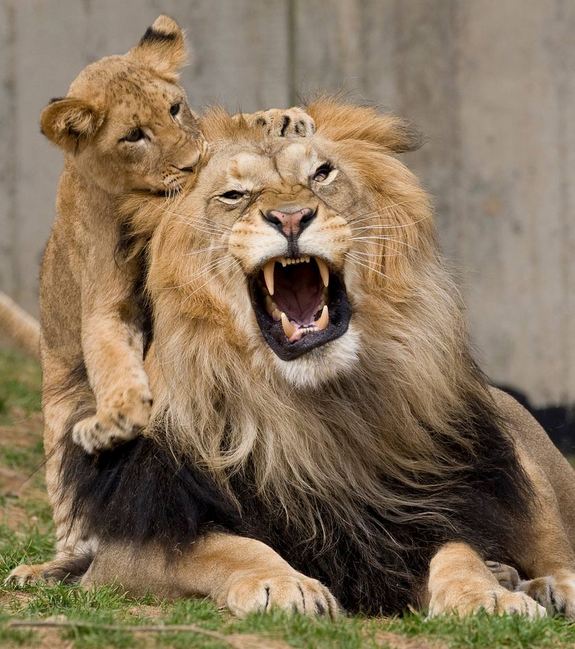Lions Live in Constant Fear

Get the world’s most fascinating discoveries delivered straight to your inbox.
You are now subscribed
Your newsletter sign-up was successful
Want to add more newsletters?

Delivered Daily
Daily Newsletter
Sign up for the latest discoveries, groundbreaking research and fascinating breakthroughs that impact you and the wider world direct to your inbox.

Once a week
Life's Little Mysteries
Feed your curiosity with an exclusive mystery every week, solved with science and delivered direct to your inbox before it's seen anywhere else.

Once a week
How It Works
Sign up to our free science & technology newsletter for your weekly fix of fascinating articles, quick quizzes, amazing images, and more

Delivered daily
Space.com Newsletter
Breaking space news, the latest updates on rocket launches, skywatching events and more!

Once a month
Watch This Space
Sign up to our monthly entertainment newsletter to keep up with all our coverage of the latest sci-fi and space movies, tv shows, games and books.

Once a week
Night Sky This Week
Discover this week's must-see night sky events, moon phases, and stunning astrophotos. Sign up for our skywatching newsletter and explore the universe with us!
Join the club
Get full access to premium articles, exclusive features and a growing list of member rewards.
Some lions in the wild now live within a "landscape of fear" as a result of threats posed by humans.
Lions have drastically changed the way they behave and perceive their environment because of new, numerous and deadly clashes with humans, according to a new study, published in the Journal of Applied Ecology,
NEWS: Wild Chimps Outwit Hunters
"The 'landscape of fear' represents relative levels of predation risk as peaks and valleys that reflect the level of fear of predation an animal experiences in different parts of its territory," lead author Marion Valeix of the University of Oxford's Wildlife Conservation Research Unit, told Discovery News.
She and colleagues Graham Hemson, Andrew Loveridge, Gus Mills and David Macdonald explained that most prey animals live within a fearful mindset which keeps them on a constant, stressed out watch. Now even high-level predators may live this way too when they exist in or around human-dominated landscapes.
The researchers studied the behavior, foraging and territory of lions living in one of the last natural migratory systems, the Makgadikgadi Pans National Park in Botswana, where abundant packs of Burchell's zebra and blue wildebeest live in different parts of the park on a seasonal basis.
Lands used by people for grazing their livestock surround the protected wilderness area. This creates a human-lion conflict, since when the zebra and wildebeest move en masse out of lion areas, many lions will resort to hunting livestock, such as cattle, to avoid losing established territories and reproductive loss, among other reasons.
Get the world’s most fascinating discoveries delivered straight to your inbox.
GPS tracking of the lions determined that the major driver of lion behavior was the risk of conflict with humans. While the herders in Botswana do not always have easy access to firearms, some do.
Hemson said "we extracted lead shot from one lion in the study and another lion was shot in the spine and paralyzed. As such, we have evidence that lions may survive encounters with better armed people, and these surely make a lasting impression" on the other lions.
He does not think lions are born with this fear, since cubs are very inquisitive and would regularly follow his "vehicle and circle it and even test the bumper with their teeth and paws." But through their mother and other pride members, they learn to fear humans as they grow up.
While a handful of very large protected areas, such as in Kalahari national parks, may permit lions to live without encroaching on human, "these areas are getting fewer and fewer," Hemson said.
In Botswana, the researchers hope herders will reduce the abundance of livestock left unattended at night, since these attract lions that are looking for a meal but are also trying to avoid humans. They also call for overall improved livestock husbandry, which might include more consistent use of protective enclosures.
The scientists, however, lament that during this present difficult socio-economic time, such measures are not likely to be implemented anytime soon. They hope an incentive structure might be put into place for herders, providing them with financial and other rewards to make the improvements and to promote tolerance of lions and other wildlife.
NEWS: Poisonous Rhinos Discourage Poachers
Johan du Toit, head of the Wildland Resources Department at Utah State University, wrote in a commentary, "The Makgadikgadi cattle herders and lions exemplify the human-wildlife conflict that has existed ever since livestock domestication began. Now, however, with advanced weapons and poisons, expanding human and livestock populations and reduced indigenous prey abundances, humans have virtually eradicated large predators -- and big cats in particular -- from the world's rangelands."
Du Toit, however, agrees that "there could be smarter ways of mitigating the conflict."
He points out that prey animals benefit from fear, using it to avoid risks in parts of their territory. Now that we know wild lions can experience similar near-continuous fear, he believes "smart managers could make more use of it in mitigating human-wildlife conflict."
This article was provided by Discovery News.
 Live Science Plus
Live Science Plus










